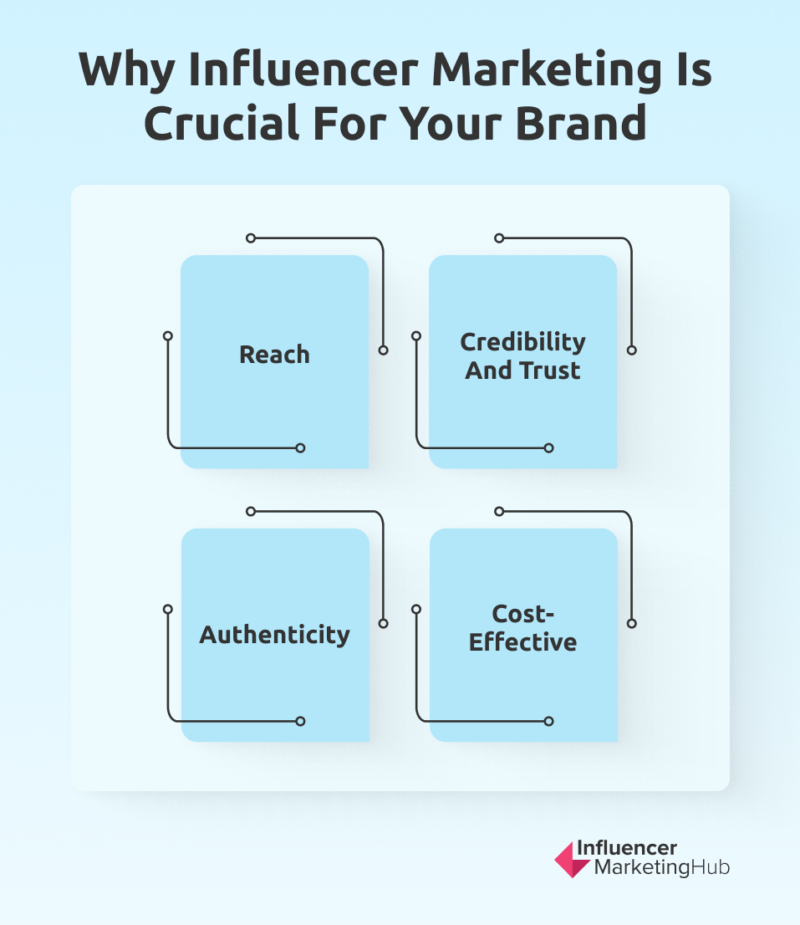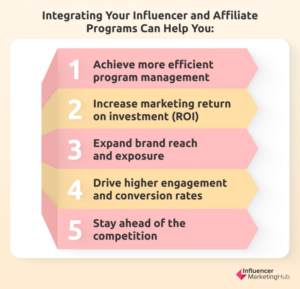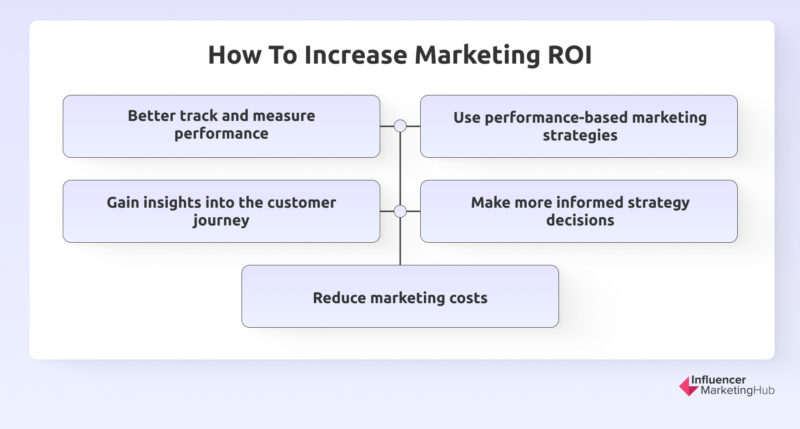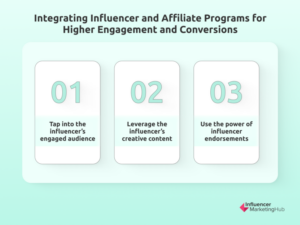As a marketer, you know all too well the struggle of trying to keep up with the latest trends and strategies in the fast-paced digital world. But there’s one thing you can’t afford to overlook: the growing importance of integrating your affiliate and influencer programs. With the influencer market expected to reach a staggering $22.2 billion by 2025, and the lines between affiliate and influencer marketing becoming increasingly blurred, failing to integrate these programs is a risk you simply can’t afford to take.
While affiliate marketing and influencer marketing are often treated as separate entities, the truth is that integrating these two programs can lead to incredible results and increased performance. And, as the convergence of affiliate and influencer continues, this becomes even more critical. If you’re not already integrating your influencer and affiliate programs, you’re putting your brand at risk of falling behind the competition.
Don’t let your brand fall behind the competition – take action now to harness the full potential of these powerful marketing channels.
Why Not Integrating Your Affiliate and Influencer Programs is a Risk You Can’t Afford to Take:
The Influencer Market is Growing at a Rapid Pace
The influencer marketing market is booming, and the growth doesn’t seem to be slowing down anytime soon. According to forecasts, the market is expected to grow to $17.4 billion by 2023, reflecting an impressive 14.47% increase from the 2022 market size of $15.2 billion. And it’s not stopping there. The market is projected to continue its upward trajectory and is expected to hit a staggering $22.2 billion by 2025, which represents a substantial growth rate of 46.05% from the 2022 market size.
This market represents a significant opportunity to tap into the growing trend of influencer marketing and reach a large and engaged audience.

Influencer marketing has become an essential component of many organizations’ marketing strategies for several reasons:
- Reach: Influencers often have a large and engaged following on social media, which can help organizations reach new audiences and expand their brand reach.
- Credibility and Trust: Influencers have established credibility and trust with their followers, who often view them as experts in their respective niches. When influencers endorse a brand’s product or service, their followers are more likely to trust and engage with the brand.
- Authenticity: Influencers often create content that is relatable and authentic, which can help brands connect with their target audience in a more genuine and meaningful way.
- Cost-Effective: Influencer marketing can be a cost-effective way to promote a brand’s products or services, especially when compared to traditional advertising methods such as TV or radio ads.
On its own, influencer marketing enables stronger connections with a target audience, enhanced brand recognition, and higher engagement and conversions. With the convergence of affiliate and influencer marketing, the influencer channel can become even more powerful in driving success.
What is the “Convergence” of Affiliate and Influencer Marketing … And Why Does It Matter?
Both affiliate and influencer marketing are essential channels for brands, but their strategies and responsibilities have traditionally been handled by different teams.
Traditionally we’ve seen:
- Affiliate marketing focused on driving sales and conversions
- Influencer marketing focused on building brand awareness and engagement
However, as both channels evolved, marketers realized that they could achieve better results by integrating the two programs.
We are seeing a more rapid confluence or convergence between these two industries as influencer teams explore ways to create more outcome-driven programs and prove their overall value. Similarly, affiliate teams are increasingly interested in using influencer opportunities to expand their programs.
While the growing maturity of technologies and strategies in these spaces is creating a lot of potential for convergence, it is also causing some confusion about what this convergence entails – and why it is so important to a partnership marketing strategy.
This convergence has become critical as the importance of influencer marketing has continued to increase. Influencer marketing has become a key component of many marketing strategies, with brands using influencers to reach their target audience and build brand awareness.
Take advantage of the strengths of both channels to achieve better results in your organization. By integrating your influencer and affiliate programs, you can:

The integration can help you save time and resources, streamline processes, unify tracking and reporting, and achieve better results for your overall partnership program.
Still not convinced?
Integrated Programs: Why Taking the Leap is Crucial
Discover why integrating these two programs is crucial for staying ahead of the competition and avoiding falling behind.
1. Simplified Program Management
Managing an influencer partner program can be a time-consuming and complex process. From finding the right influencers, to negotiating contracts, and tracking performance, it can quickly become overwhelming. By integrating your influencer program into your affiliate program, you can streamline the process and simplify the management of your influencer partnerships.
Here are a few ways:
- Consolidating processes and tools: Did you know that it is possible to manage partnerships, track performance, and optimize your influencer campaigns using many of the network platforms used for affiliate program management? By integrating your influencer program into the same platform, you can use the same set of tools and processes to manage both programs, reducing the time and resources needed to manage the program and freeing up valuable resources to focus on other aspects of your marketing strategy.
- Simplifying contract negotiation: By integrating Affiliate programs typically have a standardized contract that outlines the terms of the partnership. By integrating your influencer and affiliate programs, you can leverage the contract outlines and processes for both affiliate and influencer partnerships, with some modifications to account for the unique requirements of each partnership, saving time and resources.
- Unified tracking and reporting: Affiliate programs have sophisticated tracking and reporting tools that can help you monitor the performance of your affiliate partnerships. By integrating your influencer program into the same platform, you can use the same tracking and reporting tools to monitor the performance of both affiliate and influencer partnerships, providing you with a unified view of the performance of all your partnerships, which can help you optimize your campaigns and improve your ROI.
Integrating your influencer partnership program into your affiliate program can significantly simplify program management, reducing the time and resources needed to manage the program and freeing up valuable resources to focus on other aspects of your marketing strategy. By consolidating the processes and tools required to manage both programs, you can achieve your brand’s marketing goals more efficiently and with better results.
2. Maximize Marketing ROI
Many influencer programs track so-called “vanity metrics” such as likes or shares rather than those that track measurable outcomes such as conversions or sales. Integrating your influencer and affiliate programs can help you gain greater visibility into the performance of your influencer partnerships and ROI of this channel. By combining the power of influencer marketing with the performance-based revenue model of affiliate marketing, you can achieve a higher return on investment for your marketing efforts – and make more informed strategy decisions.

Here’s how:
- Better track and measure performance: Through program integration and utilization of the same tracking and reporting tools as the affiliate program, you can measure influencer partnership outcomes rather than simply vanity metrics. This will enable you to adjust strategy accordingly to improve ROI of both your influencer campaigns and your overall partnership program.
- Use performance-based marketing strategies: By incentivizing influencers to promote the brand’s products and services using performance-based marketing strategies, such as pay-per-click, pay-per-sale, and pay-per-lead, you can drive better campaign results and achieve marketing goals more efficiently.
- Gain insights into the customer journey: Integrating your influencer and affiliate programs and utilizing outcome-based performance marketing tools will enable you to understand which influencers are driving the most conversions and sales. You’ll be better able to adjust strategy accordingly, through tracking the customer journey from the initial influencer touchpoint to the final sale.
- Make more informed strategy decisions: By combining the power of influencer marketing with the performance-based revenue model of affiliate marketing, you can make more informed strategy decisions and optimize their partnerships to achieve a higher ROI for your marketing efforts.
- Reduce marketing costs: Leveraging the same platform and tools for both programs will enable you to reduce the time and resources needed to manage the overall program and free up valuable resources to focus on other aspects of the marketing strategy.
If your organization is like many, you have been tasked with finding efficiencies and improving ROI. Oftentimes these can feel like conflicting priorities. However, affiliate and influencer program integration enables both – making it a win-win for both you and your organization’s leadership.
3. Increased Reach and Exposure
Scaling an influencer program can be challenging, especially as you seek to expand your reach and engage a larger audience. By integrating your influencer program into your affiliate program, you can take advantage of the network and tools that affiliate programs offer, which can help you scale your influencer partnerships – and open up new doors for increased reach and exposure in both new and existing market.
Some ways include:
- Access to a larger network of affiliates: Affiliate programs typically have a large network of affiliates who promote the brand’s products and services. By integrating the influencer program into the affiliate program, you can engage with a broader audience.
- Cross-promotion of affiliate and influencer content: Integrating your brand’s influencer and affiliate programs can help drive a more cohesive marketing strategy and ensure that all marketing efforts are aligned. Cross promotion enables you to reach more potential customers and achieve greater exposure.
- Greater control over brand messaging: By extending affiliate program guidelines to influencer partnerships, you can ensure that the brand messaging is consistent and aligned across all marketing channels. This can help maintain brand image and reputation and ensure that it is presented in the best possible light to its target audience.
Influencer and affiliate program integration can amplify your brand’s message and reach new markets and audiences that were not previously engaged.
4. Increased Engagement and Conversion Rates
Influencer partnerships have been shown to drive higher engagement and conversion rates compared to traditional advertising methods. By integrating your influencer program into your affiliate program, you can take advantage of this increased engagement and drive higher conversion rates for your brand.

Here are some ways in which integrating the two programs can help increase engagement and conversion rates:
- Tap into the influencers’ engaged audience: Influencers have built a strong relationship of trust with their audience, which can lead to higher engagement rates. By partnering with influencers, you can tap into their engaged audience and increase engagement rates for your brand across the totality of your partnership marketing program.
- Leverage the influencers’ creative content: Influencers are experts in creating content that resonates with their audience. By partnering with influencers and giving them the creative freedom to showcase products or services in their unique style, you can increase engagement rates and drive higher conversion rates.
- Use the power of influencer endorsements: Influencer endorsements can be a powerful tool for driving higher conversion rates. By partnering with influencers and having them endorse products or services, you can increase credibility and trust with their audience, leading to higher conversion rates.
By combining the strengths of both your influencer and affiliate programs, you can achieve higher engagement and conversion rates and make more efficient use of your marketing resources.
Stay Ahead of the Competition
In today’s fast-paced business environment, staying ahead of the competition is crucial for any brand that wants to succeed. The convergence of influencer and affiliate marketing offers a unique opportunity for marketers to create a more streamlined and effective partnership marketing program that can give them a competitive edge.
The convergence of influencer and affiliate marketing is a game-changer for brands looking to stay ahead of the competition. By integrating your influencer program into your affiliate program, you can create a more streamlined and effective partnership marketing program that can provide significant advantages, including increased efficiency, better tracking and reporting, more cohesive messaging, access to a larger audience, and increased engagement and conversion rates.
Don’t risk falling behind the competition in today’s fast-paced digital landscape. Integrating your influencer and affiliate programs is no longer optional – it’s essential for achieving better results and staying ahead of the curve. Get the complete guide on influencer partnership marketing for more on the billion-dollar influencer industry and how to integrate influencer marketing into your affiliate program.

ABOUT THE AUTHOR
Adriné Harutyunyan
Adriné Harutyunyan is the Director of Influencer Marketing at Acceleration Partners (AP) and is a driving force behind AP’s performance-driven influencer practice. Adrine spearheaded the launch of AP’s outcomes-oriented influencer offering, an innovative approach towards delivering measurable business outcomes for AP clients. Additionally, Adrine’s leadership has been instrumental in AP’s recent acquisitions of Influencer Response and Volt, which have enabled the agency to expand its market-leading macro influencer and paid amplification services into the affiliate channel. As an accomplished leader, Adrine is well-versed on the convergence of influencer and affiliate programs. Before joining AP, Adrine spent 3+ years at CJ Affiliate where she created solutions-oriented strategies for diverse brands looking to scale their affiliate channels and expand into the influencer sector.
About the Author
Writer
From time to time we feature Guest Contributors who we see to be thought leaders in the social media and influencer marketing industry. The content pieces below are featured content from these authors.





